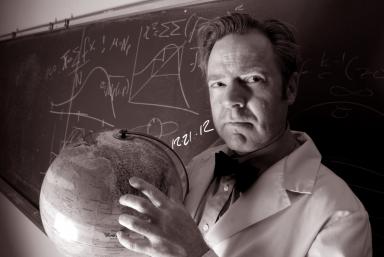P@SW: Doom 2012 - flee date confirmed

When will you flee? This is the central question of Doug McKeag’s anxiety comedy, Doom 2012. This one-man show is an exploration of the catalogue of misery that awaits us if we don’t learn to read the signs. Although it references Biblical revelations, promises of rapture and Mayan calendars (from where the date 2012 originates) its main focus is on much more scientific or “rationale” predictions of doom such as global warming, peak oil and disease pathologies.
This was a bit of a surprise – especially given the title – but a much more effective tactic if your objective is to unsettle a mainstream audience. Sure it might be spooky to hear how those Mayans predicted Hitler, the Channel Tunnel or my love life; it is far more sobering to learn how oil will run out in twenty years or how rapidly diseases adapt to new circumstances or how Toronto (or Vancouver or Calgary (McKeag’s home)) remain nuclear targets. I went in expecting to hear some whacked out theories about the earth’s polarities switching, the dead reanimating and general cosmic mayhem. I didn’t expect to be, you know, really scared.
His most compelling argument is against city-dwelling, illustrating how vulnerable those of us who choose to live in big cities are (it is from a city he is suggesting we will flee). And, you know what, he’s right. Cities are disease and vermin-infested, nuclear targets reliant on dwindling oil supplies to maintain the basic infrastructure. And when you think about the variety of threats we face, combined with rampant urbanization (which is a boon for diseases and terrorists alike) and when you factor in examples from the past where humans have suffered massive dies offs (Spanish Flu) or natural disasters (the New Orleans flood) – then it really is only a matter of time before something bad – majorly bad – happens in an urban centre somewhere in the world. Why not Toronto?
An engaging performer, McKeag is comfortable in his own skin and clearly at ease with the material (maybe too at ease for his own personal sense of safety). His relaxed demeanour only adds to the plausibility. He also plays with notions of scientific authority by running audience surveys throughout the show. When a man in a white lab coat with a clip-board and an assistant starts to analyse numbers, you tend to pay attention. The questions are all variations on the “when will you flee Toronto” after, for example, a disease outbreak, energy collapse, dirty bomb explosion?
Sure, this is bogus. But the media is always feeding us data of collective opinion as some sort of truth. Having devised surveys in the past, I found myself surprisingly engaged with and resistant to this process. I know how questionnaires are designed to lead an individual to form certain conclusions. And this is what McKeag is doing in an undisguised manner. I found myself holding out for longer than I might have otherwise when choosing my “flee” dates. Even the question itself – like the questions in market surveys – is predicated on a single conclusion: when, not if, you will flee. This cleverly works to increase our unease and despite my resistance, I found myself saying yes, within say 30 years Toronto will suffer some sort of major catastrophe that, if I were living here, would make me run away. Except for the questions about the Leafs winning the cup, that one was easy to hold out for the maximum answer: never.
The one thing that McKeag doesn’t touch on – overtly – is risk assessment. People aren’t fleeing because they have – however unconsciously or crudely – assessed the risk of living in cities and find the benefits outweigh the potential threats. I mean, have you ever lived in the country? I was reminded of the blasé-attitude most Vancouverites have towards the earthquake that is coming. It could happen tomorrow – it might not happen for a thousand years. So why worry? Of course, there are other examples where risk assessment is less logical (the way we wrap up our children against harm which has not changed significantly in forty years). It is this latter form of poor risk-assessment, linked to group dynamics that I think McKeag was exploring with the surveys.
McKeag introduces elements from his own life to spice up the proceeding, including a home movie from his childhood and clips from a movie he made in high school which involved classmates and teachers being consumed by some creature. These are nice, and welcome, touches but the piece still loses steam about three-quarters of the way through. In part because the energy driving Doom 2012 is the horror of the stories and the threats we’re facing. Once those horrors start to melt together you find yourself switching off. This leaves McKeag with a bit of a dramaturgical conundrum: does he go further down the personal story route to give the piece some sort of arc or does he introduce a new, unexpected element to reignite interest? Either of them risks making the work more “theatrical” and that might not be a good idea.
For the record, I will be fleeing Toronto on February 5, 2029. It’s a fact. A nice man in a lab coat told me so.
Doom 2012 by Doug McKeag; Directed by Duval Lang; Presented by Dandi Productions; Featuring Doug McKeag. Part of the 2008 SummerWorks Festival. If you want show times and more information run away to here.



